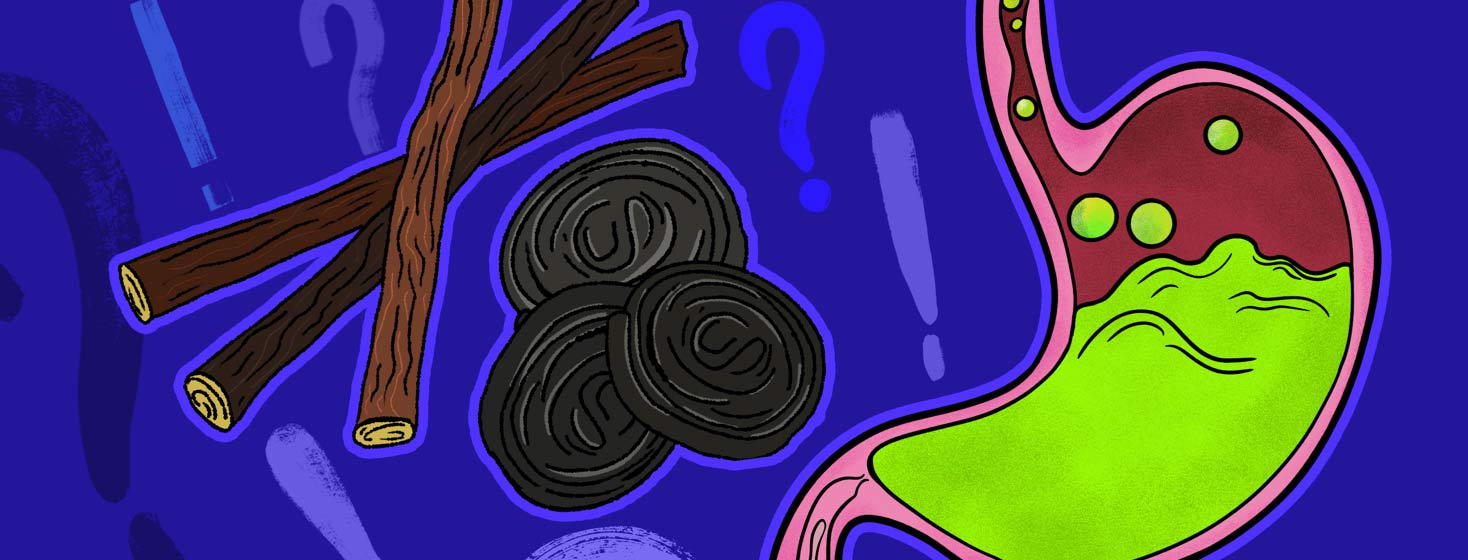Is Licorice Helpful for IBS as well as GERD?
As I have written here before, in addition to having IBS I have another digestive disorder: GERD. GERD is characterized by heartburn and reflux issues.
About 4 years ago, in desperation to quell my GERD-related symptoms because mainstream medications like proton pump inhibitors (PPIs) were failing to get them under control, I turned to herbal supplements to see if they could offer me some much-needed relief. I had read about something called chewable DGL tablets – which is essentially a form of licorice root.
I remembered reading licorice was good for tummy troubles – including indigestion and irritable bowel issues like gas, bloating and diarrhea – in the past. When my IBS was very bad in my early 20s, I purchased some capsules of licorice extract, and I don't recall it helping me much (though I think I only took it a couple of times – I didn't like the aftertaste of it).
How can licorice help IBS and GERD?
To clarify, we're not talking Twizzlers, but real licorice, more like the thick, more bitter-tasting black rope candy my grandparents snacked on when they were kids.
DGL stands for Deglycyrrhizinated licorice. This means the licorice has had most of the glycyrrhizin in it removed – a substance that can cause dangerously high blood pressure if taken too often. This means DGL is relatively safe for regular consumption (though still, anyone considering it should speak to a medical professional first, especially if they have high blood pressure or heart issues). It comes in the chewable form usually because chewing it enables saliva production for better processing I believe of the chemical compounds in it and also help activate/release the DGL before it hits the stomach. Directions usually call for chewing a DGL tablet about 20 minutes before a meal that may cause one gastric distress. Though if you missed that opportunity you can also take it about 30-60 minutes after the meal.
The DGL supposedly works by increasing mucus production in the digestive tract, in turn forming a protective coating on the stomach and protecting both it and the esophagus from acid production.
My experience with licorice
I actually found that taking DGL before dinner (and sometimes lunch) when I was having a bad GERD flare worked quite well in helping lower the frequency and severity of my reflux and heartburn. It didn't completely on its own help get rid of it, but it seemed a critical component in my new regimen. However, what also surprised me is that DGL also seemed to benefit my IBS. I noticed I felt less bloated when I took it and had less IBS-D flares or outbreaks. It was great for nausea as well, which I experience fairly often.
One downside is it does seem to mess with my hormones a bit. I find months I am taking it too much, my menstrual cycles are shorter and my PMS can be a bit more severe. I thought this was a coincidence but when I looked it up, it indicates DGL can impact hormonal cycles in women. So I tend to try to avoid taking it in the week or so leading up to my period (which can be difficult because that sometimes is when my GERD flares.)
Licorice research
As for studies, at least one study indicated DGL was more successful in treating digestive issues than some traditional over-the-counter methods, specifically stating that it was "...associated with significant improvement in symptoms of gastric and intestinal irritation and that these improvements were consistently reported as better than commonly used antacids."1 There is also a formula out there called BowelSoothe that contains DGL among other ingredients and is intended for IBS-related symptoms, though I've never tried it and can't personally attest to its effectiveness.
What I can attest to is that DGL definitely seems to have helped my GERD greatly, while also providing some symptom relief for my IBS as well, so I intend to keep it in my medicine cabinet and use it sporadically when needed.
Have you ever tried DGL for any digestive issues including IBS? Did it help? Please feel free to share your experiences in the comments section below.

Join the conversation